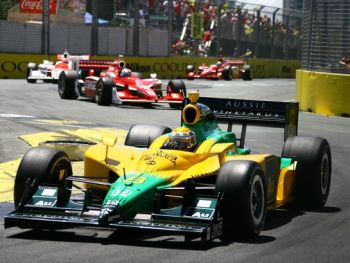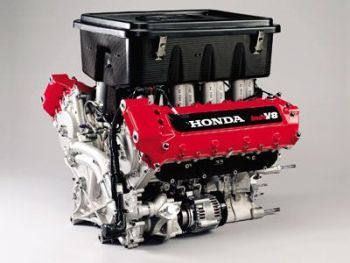
 |
|
Indy Racing League officials have confirmed
that Fiat Powertrain Technologies (FPT) is
one of the five auto manufacturers that is
taking part in round table discussions as
the single-seater series (top) bids to
expand engine supplier participation beyond
current supplier Honda (bottom). |
|
|
|
Indy Racing
League officials have confirmed that Fiat Powertrain
Technologies (FPT) is one of the five auto manufacturers
that is taking part in round table discussions as the
single-seater series bids to expand engine supplier
participation. The new engine specification planning got
underway last May and the new regulations, that will
continue to see the use of bio-ethanol fuel, will mostly
likely be introduced in 2011.
Fiat is
investigating the marketing potential of the Indy Racing
League to accompany the re-launch of its Alfa Romeo brand in
the United States, which has recently been postponed yet
again due to the severe current economic downturn, although
a limited number of the Alfa 8C Competizione sports cars
have been sold stateside in recent months through selected
Maserati dealerships.
"IndyCar has done an extremely thorough job at examining all
the future technical considerations that automotive brands are
faced with," said Paolo Martinelli, vice president of Fiat
Powertrain Technologies. "Working in concert with my peers to
help define the next generation of IndyCars has been an
enlightening and productive process that will likely have
positive connections to other global motorsports."
As well as Fiat
Powertrain Technologies, representatives from Honda
Performance Development (the current engine supplier), Audi, Porsche and Volkswagen
took part in the latest talks, guided by the "Three Es" -
efficient, environmentally responsible and economics.
Through this collective process,
the IndyCar Series will continue to work with the manufacturers
and six specialty race engine design companies in refining these
engine specifications for implementation as early as the 2011
season:
● 4-stroke engines with
reciprocating pistons
● Engine capacity not to exceed 2.0 litres
● Dual-overhead cam shaft with 4 valves per cylinder
● Single turbo charger systems will be permitted
● Direct injection systems will be permitted
● Continue the league's leadership position with the use of
alternative fuels
● Engine life between rebuilds of 3,750 miles
● Five-year sealed engine homologation process that will define
areas with possible annual updates
● Cost containment engine lease ceiling that is applicable to
all participants
The series' new engine architecture will align with the
direction being taken by automotive manufacturers around the
world, which will allow cost-effective team participation while
allowing engine manufacturers flexibility in up-tuning and/or
down-tuning the engine for possible use in other forms of
motorsports. Specifications are expected to be finalized in the
next several months.
Three manufacturer roundtable meetings, attended by senior
executives from some of the world's leading and most prestigious
automotive brands, have been held since the groundbreaking
planning process was introduced in May 2008 to bring about
expanded engine manufacturer participation in the series. "The IndyCar Series is steeped in history and synonymous with
automotive technical innovation," said Donatus Wichelhaus, head
of engine development for Volkswagen Motorsport. "The IndyCar
Series has been proactive to take a global leadership role in
defining an engine and technical platform that will further
promote R&D development and innovation that will have positive
effects on production-based consumer cars."
The meetings also have included input from Firestone, the
exclusive tire supplier to the IndyCar Series, and chassis
supplier Dallara. In addition to the engine specifications, the
IndyCar Series has been investigating innovative ways to partner
its teams with the manufacturers.
|